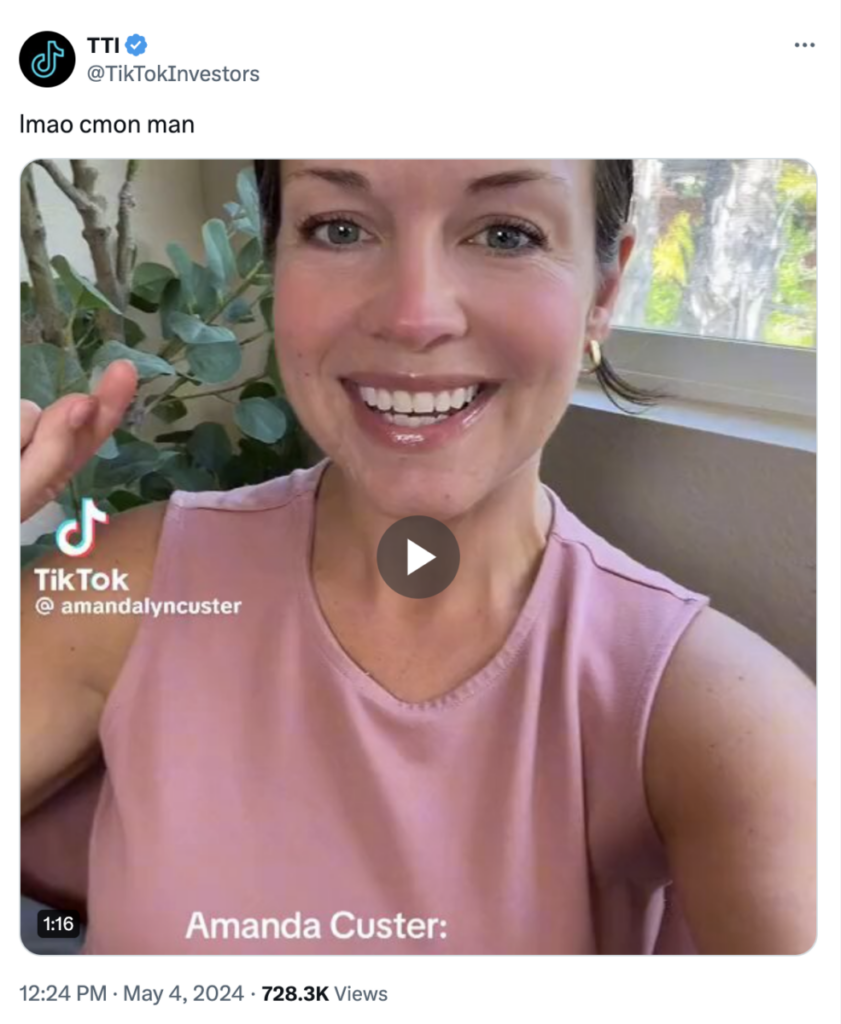If you're an investor and you're on TikTok, doubtless you've seen them: astonishing claims and advice from the 'financial professionals'. They claim techniques and tax breaks and little-known tricks to make you tons of cash fast. Sadly, most of it falls in the too-good-to-be-true bucket. If it doesn't pass the sniff test ...
"They can't just be making it all up?" you ask. Yes, actually, they just make it up. They are all chasing the elusive virality which they can trade for ads and influence. And some of this stuff is downright dangerous.
My colleague Barry Ritholtz of Ritholtz Wealth Management wrote a column on this the other day. I can't improve on his take, so I'm reprinting it here for you.
TikTok is for entertainment.
Enjoy your spring!
— Robin
TikTok Investors
Nestled in between lip-sync dancers and fashion influencers, financial fraud lurks on TikTok.
At least one person1 has noticed the risks to young consumers of social media: Since August 2020, @TikTokInvestors has been curating the most outrageous money-losing and dangerous videos culled from the “financial experts” on the ByteDance-owned social network.
The advice ranges from wrong to risky to criminal:
-401ks? Dumb idea!
-Want to earn more money? Day trade at home!
-Want to turn $100 into a million? Follow my strategy earning 2% a day!
-Pay taxes? Not if you spend tax season on a boat!
No, no, no and Hell, no!
It is a massive Dunning Kruger exercise of inexperienced but overly confident “Finfluencers” reducing complex issues about money to slick but misleading sales pitches. No audited returns, mathematically improbable claims, and zero accountability But none of these TikTok influencers sell securities to clients, so they do not fall under the regulatory oversight of the Securities and Exchange Commission (SEC).2
Sure, sometimes mainstream media is bad, but social media is much worse. No editors or gatekeepers, just a Wild West of grifters mixed in with everybody else. Bad financial advice reaches naïve, impressionable consumers without any guardrails or controls. On Social Media, grifters can make outlandish claims without fear of reprisal. It is a bizarre set of circumstances that allows people to be defrauded on a regular basis. Only after people are conned can prosecutors pursue the scammers.
I reached out to the proprietor behind @TikTokInvestors for some background; they shared some of the more egregious TikTok posts, along with some background on each:
@TikTokInvestors:
“Apart from his misleading arrogance and the inaccurate market statistics mentioned, a 401K is possibly the best investment vehicle for the average American. I doubt he’s run the real numbers of being invested in the stock market tax deferred with an additional company match. Always be wary of social media influencers who use engagement bait tactics to sell a course or event.”
@TikTokInvestors:
“Turning $100 into $1mln by earning 2% daily in the market is nearly mathematically impossible. What’s dangerous here is that she’s well spoken, seems trustworthy, and comes across confident in her ability to do this for her clients. The reality is she can’t; the majority of professional investors in the world can’t even beat the S&P on an annual basis.”
Some of the more absurd claims date back to the pandemic. One of my faves is this handsome couple explaining “How do we maintain our lifestyle?”
TTI noted:
“This was at the peak of the bull market during the pandemic and it still makes me laugh. It goes without saying that investing is not this easy; whether you’re trading or investing long-term there’s a variety of factors and risks to consider before putting capital to work. Assuming every stock goes up and to the right is hilariously ignorant.”
I heard through the grapevine that they no longer daytrade, and have since moved into Real Estate flipping…
There is lots more: A slew of bad tax advice likely to get-you-sent-to-jail-for-tax evasion: Live on a boat during tax season! (Nope); Spend $400k on a house, and the $189k depreciation offsets your taxable income (LOL). There were so many of these that the IRS had to post a list of 46 tax avoidance claims covering the most ridiculous statements, noting any that are “the same as or similar to the following are frivolous.” Oops.
Two others worth mentioning: It’s probably better if you do not teach your home-schooled 10-year olds to day trade. And, I find the phrase “Index Bro” amusing: Don’t index, just buy the best stocks! (why didn’t I think of that?)
This is not a comprehensive list, and there are too many others to mention, but these give you a flavor of what’s happening in the “Finfluencer” space.
While the government debates whether or not to ban TikTok, investors should consider making some changes on various social media themselves. A good start would be eliminating all of the terrible FinTok advice on taxes, day trading and investing.
See also:
Welcome to FinTok, Where Day Trading, Options Investing, and Misinformation Reign (Institutional Investor, September 25, 2020)
TikTok Influencers Promise They’ll Make You Rich. The Math Doesn’t Add Up (Rolling Stone, January 24, 2024)
How TikTok Is Wiring Gen Z’s Money Brain (WSJ, May 4, 2024)
———————————
Previously from Barry:
Simple, But Hard (January 30, 2023)
One-Sided Markets (September 29, 2021)
The Price of Paying Attention (November 2012)



